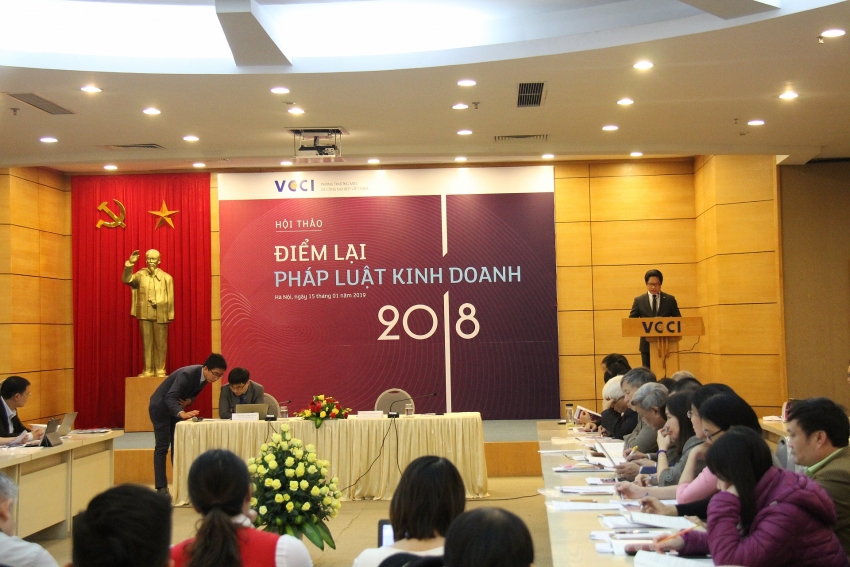Business law reform must press ahead
 |
| The seminar on Vietnam's business law reform |
Vu Tien Loc, chairman of the Vietnam Chamber of Commerce and Industry (VCCI), said at the seminar that the government has assigned the VCCI to gather and review irrationalities in business law as well as to make recommendations to improve the economic environment, ensuring transparency and creating favorable conditions for businesses.
2018 witnessed wide-ranging business reform, with many business conditions cut or simplified. At the beginning of the year, specific targets on reducing and simplifying conditions have been given by the government in Resolutions 01 and 19. Besides, many conditions that lack transparency have also been removed.
As a result, hundreds of business conditions have been abolished and simplified, improving the business environment on many fronts. However, this result still has not met the expectations.
The in-depth analysis of each business condition shows that many cases of reduction are only formal in nature, ensuring quantitative requirements without having much practical relevance. Many inadequate business conditions remain in the printing industry and education, for instance.
Some amendments of investment conditions fall short or even contradict their target, causing difficult for businesses. Abolishing one license but asking for another and the issuance of new licenses are also seen as counterproductive.
Overall, the seminar held that the administrative procedures are in the right direction, but fall short of the goals.
Although in 2018, the ministries issued plans and drafted documents to simplify administrative procedures in the areas under their management. However, the new documents are still somewhat clunky.
Some documents outline procedures with many complicated steps, making the procedures lengthy, costly, and waste enterprises’ time.
For example, the procedure for withdrawal of a multi-level marketing firm must be certified by the Ministry of Industry and Trade (MoIT) twice.
Besides, some administrative procedures are stated in documents without any regulation outlining how the procedure works.
A specific example is Article 9 of Decree No.56/2018/ND-CP stipulating that "when renovating or upgrading works that violate the scope of railway protection, project investors must have technical solutions to not affect the stability, longevity, and safety of railway works and must be approved by competent authorities before implementation.” However, there is nothing on how to get approval from a competent authority in any legal document.
| 2018 witnessed the reform of many business conditions. At the beginning of the year, specific targets on reducing and simplifying conditions have been given by the government in Resolutions 01 and 19. Besides, many conditions that lack transparency have also been removed. |
Regarding specialised inspections, according to the statistics of Vietnam Customs, from the second quarter of 2015 to the first quarter of 2018, the number of items under management and specialised inspection decreased by 4,403 items. Among them, the Ministry of Health cut 868 items, the Ministry of Agriculture and Rural Development 1069 items, the Ministry of Science and Technology 532 items, and the Ministry of Industry and Trade 989 items. Thereby, 93 per cent of specialised inspection documents have been adjusted.
However, the specialised inspection still has many unsatisfactory points.
According to statistics from the Ministry of Finance, there are 188 groups of goods which must carry out multiple procedures at the same time as well as various forms of management and inspections by the same ministry or many ministries. For example, electric rice cookers, autoclaves, and pressure cookers are managed by three ministries, the MoST, MoIT, and the MoH. Similarly, cars under nine seats are managed by three ministries, the MoT, MoST, and the MoIT.
Also at the seminar, some delegates also commented on the real situation of business law in Vietnam.
Phan Duc Hieu, deputy director of the Central Institute for Economic Management (CIEM), said that, “In general, Vietnam stops at finding and removing barriers. The biggest challenge now, as far as I can see, is that all reforms are from the government, imposed by the government, but no agencies think to take the initiative to reform themselves. So, will the reform run out of momentum if the government stops pressing? Controlling new regulations is also a challenge. The mechanisms of enforcement are not really clear. The scope of the reforms is still very limited. For example, the reform of business conditions is of a very small scope, amounting to a few legal documents. There are innumerable constraints and obligations that constrain businesses.”
A new year of 2019 has begun and which barriers to remove remains a problem to be solved.
What the stars mean:
★ Poor ★ ★ Promising ★★★ Good ★★★★ Very good ★★★★★ Exceptional
 Tag:
Tag:
Related Contents
Latest News
More News
- Hermes joins Long Thanh cargo terminal development (February 04, 2026 | 15:59)
- SCG enhances production and distribution in Vietnam (February 04, 2026 | 08:00)
- UNIVACCO strengthens Asia expansion with Vietnam facility (February 03, 2026 | 08:00)
- Cai Mep Ha Port project wins approval with $1.95bn investment (February 02, 2026 | 16:17)
- Repositioning Vietnam in Asia’s manufacturing race (February 02, 2026 | 16:00)
- Manufacturing growth remains solid in early 2026 (February 02, 2026 | 15:28)
- Navigating venture capital trends across the continent (February 02, 2026 | 14:00)
- Motivations to achieve high growth (February 02, 2026 | 11:00)
- Capacity and regulations among British areas of expertise in IFCs (February 02, 2026 | 09:09)
- Transition underway in German investment across Vietnam (February 02, 2026 | 08:00)

























 Mobile Version
Mobile Version